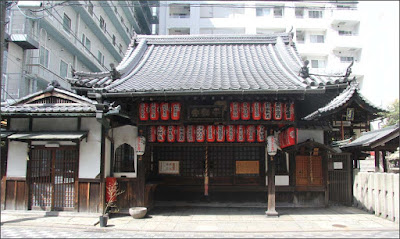:::::::::::::::::::::::::::::::::::::::::::::::::::::::::::::::::::::::::::::::::::::::::::::::::::::::::::::::::::::::::::
Soojoogadani Fudoo Doo 僧正ガ谷不動堂
Fudo Hall in Sojogatani
僧正谷
Sojo-ga-dani Fudo-do (Fudo Hall in Sojo Valley)
京都市左京区鞍馬本町 / 1074 Kurama Honmachi, Sakyo-ku, Kyoto
Both readings are given, Sojogatani and Sojogadani.

The Fudo Hall is home to a statue of Fudo Myo-O carved by Dengyo Daishi. In his desire to spread Tendai Buddhism, he performed a special ritual before carving the statue.
ittoo sanrai 一刀三礼 carving one part and praying three times
. Saicho, Dengyo Daishi 伝教大師最澄 .
(766-822)
The valley 僧正谷 Sojogatani is more famous for the tales about Ushiwakamaru.
Many old Sugi cedar trees grow in the surrounding forest, which is also the stage for the 鞍馬天狗 Kurama Tengu tales about 牛若丸 Ushiwakamaru.
Opposite the Fudo Hall is
Gikeidoo 義経堂 Gikei-Do, a hall dedicated to Yoshitsune (Ushiwakamaru)
. 牛若丸 Ushiwakamaru 源の義経 Minamoto no Yoshitsune .

At Sojogatani in the Kurama mountains
Ushiwakamaru learns sword fighting from a Tengu
歌川広重 Utagawa Hiroshige
義経 is read Yoshitsune or Gikei.
. Kurama Yama 鞍馬山 Mount Kurama in Kyoto .

大聖不動明王 Daisho Fudo Myo-O
:::::::::::::::::::::::::::::::::::::::::::::::::::::::::::::::::::::::::::::::::::::::::::::::::::::::::::::::::::::::::::

source : kifulog.shogi.or.jp/kisei
郷田棋王 の扇子「一刀三礼」
The fan of Shogi player 郷田 真隆 Goda Masataka
ittoo sanrai 一刀三礼 itto sanrai
carving one stroke with the blade and praying three times
for copying the sutra
ichiji sanrai 一字三礼
writing one letter and praying three times
for painting a Buddha
ippitsu sanrai 一筆三礼
painting one part and praying three times
- quote -
ittou sanrai 一刀三礼
Also ichiji sanrai 一字三礼, ittou sanpai 一刀三拝.
Lit. to worship three times with every stroke.
A practice employed by an artist carving a Buddhist image, who would pray to the Buddha three times after every stroke of a knife.
Ichiji sanrai, means to worship three times with every letter, a practice carried out by an artist copying a Buddhist sutra, who would pray three times after every letter that he wrote.
The idea of ittou sanrai is said to originate in the Kamakura period, and represented a deep Buddhist faith expressed in the piety of the artist in the making of the image. It is not known whether any Buddhist statues were actually made according to this process, but there are legends associated with many temples that indicate the practice was used.
- source : JAANUS -
:::::::::::::::::::::::::::::::::::::::::::::::::::::::::::::::::::::::::::::::::::::::::::::::::::::::::::::::::::::::::::
. Legends and Tales from Japan 伝説 - Introduction .
.................... Gunma 群馬県
高崎市 Takasaki
Long ago on the banks of the Usui River 碓氷川, there was a thatched hut housing a statue of Kannon 観音様, the bodhisattva of compassion. Legend has it that after a flood the villagers found an old log of fragrant wood and placed it in the hut. One day, during the Enpoo period (circa 1680), an old ascetic named Ichiryo Koji 一了居士 arrived and reverently carved a seated figure of Daruma Daishi out of the piece of fragrant wood, praying after each stroke.
Subsequently, both statues were enshrined there.

The Fuku-Daruma originated here at the Shorinzan Daruma-Ji. Shinetsu, the founder of this temple, began a custom of giving the farmers pictures of Bodhidharma, which he would draw with a single brushstroke, as a talisman to ward off evil during the year.
. 少林山達磨寺 Shorinzan Dharma-ji .
.................... Miyagi 宮城県
白井市 Shiroi, 下戸沢 Shimotozawa
Tobifudoo 飛び不動 "the Flying Fudo"
It is said Kobo Daishi Kukai 弘法大師 carved this statue with respect to Itto Sanrai.
Once the Fudo Hall was all in flames, so the statue flew for a secure place in a rock cave. This is the reason why the halo of the statue has scratches - from the rock cave. So this statue does not have a halo any more.
In 1731 during the Great Earthquake on the 7th day of the 9th lunar month a huge boulder came down from the mountain behind the hall, but only one pillar of the small hall was crashed and like a miracle again the statue was not hurt.
. Legends about Fudo お不動さま from Miyagi .
.......................................................................
- reference : nichibun yokai database 妖怪データベース -
::::::::::::::::::::::::::::::::::::::::::::::::::::::::::::::::::::::::::::::::::::::::::::::::::::::::::::::::::::::::::

. - Join Fudo Myo-O on facebook - Fudō Myō-ō .
:::::::::::::::::::::::::::::::::::::::::::::::::::::::::::::::::::::::::::::::::::::::::::::::::::::::::::::::::::::::::::
. Pilgrimages to Fudo Temples 不動明王巡礼
Fudo Myo-O Junrei - Fudo Pilgrims .
[ . BACK to WORLDKIGO . TOP . ]
[ . BACK to DARUMA MUSEUM TOP . ]
- - #sojogatani #kuramafudo #sanrai #ittosanrai - -
:::::::::::::::::::::::::::::::::::::::::::::::::::::::::::::::::::::::::::::::::::::::::::::::::::::::::::::::::::::::::::















































